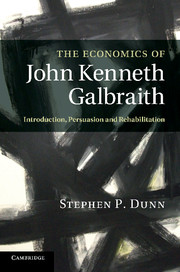Book contents
- Frontmatter
- Contents
- List of figures
- List of tables
- Foreword
- Preface
- Acknowledgments
- 1 The eclipse of The New Industrial State?
- 2 A life in our times
- 3 The economics of John Kenneth Galbraith
- 4 The methodology of John Kenneth Galbraith
- 5 The general theory of advanced development
- 6 Why people are poor
- 7 Uncertainty and the modern corporation
- 8 A theory of the multinational corporation
- 9 The management of specific demand
- 10 Money and the real world
- 11 A man for our times
- 12 The origins of the Galbraithian system: talking to John Kenneth Galbraith
- References
- Additional works by Galbraith
- Index
1 - The eclipse of The New Industrial State?
Published online by Cambridge University Press: 10 January 2011
- Frontmatter
- Contents
- List of figures
- List of tables
- Foreword
- Preface
- Acknowledgments
- 1 The eclipse of The New Industrial State?
- 2 A life in our times
- 3 The economics of John Kenneth Galbraith
- 4 The methodology of John Kenneth Galbraith
- 5 The general theory of advanced development
- 6 Why people are poor
- 7 Uncertainty and the modern corporation
- 8 A theory of the multinational corporation
- 9 The management of specific demand
- 10 Money and the real world
- 11 A man for our times
- 12 The origins of the Galbraithian system: talking to John Kenneth Galbraith
- References
- Additional works by Galbraith
- Index
Summary
Though economic analysis and general reasoning are of wide application … every change in social conditions is likely to require a new development of economic doctrines.
Alfred Marshall (1920: 37)If there were justice in the world, John Kenneth Galbraith would rank as the twentieth century's most influential American economist. He has published several books that are among the best analyses of modern US history, played a key role in midcentury policymaking, and advised more presidents and senators than would seem possible in three lifetimes. Yet today, Galbraith's influence on economics is small, and his influence on US politics is receding by the year.
J. Bradford DeLong (2005: 126)In the tributes and obituaries that followed John Kenneth (Ken) Galbraith's death on April 29, 2006, much was made of his long and varied career, as well as his closeness to power. John Kenneth Galbraith was a distinguished Harvard economist, an accomplished diplomat, a political activist, a confidant and adviser to presidents, a memoirist and novelist, and one of the best-selling economic writers of his time. The conventional reflection noted his colorful life, celebrated his mordant wit and prose, yet generally castigated his theorizing as being obsolete. This is a major travesty. Galbraith was one of the leading progressive intellectuals of the post-World War II period who, though part of the establishment, was happy to point out its self-serving interests and convenient myths. But he was more than just a gadfly.
- Type
- Chapter
- Information
- The Economics of John Kenneth GalbraithIntroduction, Persuasion, and Rehabilitation, pp. 1 - 15Publisher: Cambridge University PressPrint publication year: 2010



